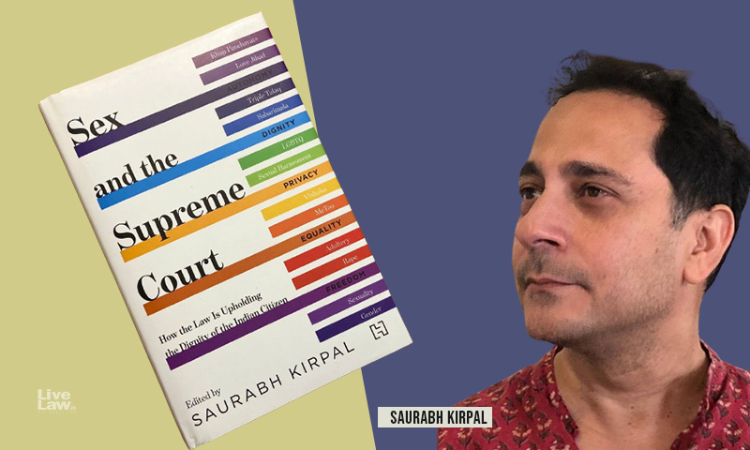A Thurgood Marshall from Queeristan
FAISAL CK
8 Dec 2021 3:50 PM IST

"One small step for the Indian judiciary, one giant leap for India's LGBTQ+ community''- it may be the proper way to express the gaiety as the Supreme Court Collegium has recommended the elevation of senior advocate Saurabh Kirpal as a judge of the Delhi High Court. Kirpal may become the country's first openly gay judge in a constitutional court, if approved by the Union Government. His recommendation was entangled in wrangle for the past four years, despite his experience and expertise in law, due to the Union Government's preliminary objections because of his sexual orientation and the foreign nationality of his life-partner.
Kirpal has two decades' practice in the Supreme Court. He contributed richly to the LGBTQ+ movement in India as he was the counsel for Navtej Singh Johar, Ritu Dalmia and others in the celebrated case that led to the landmark reading down of Section 377 of the Indian Penal Code in 2018, thus decriminalising same-sex relations. He has edited an anthology titled Sex and the Supreme Court: How the Law is Upholding the Dignity of the Indian Citizen in which the authors include Justice M.B. Lokur, Justice B.D. Ahmed, Justice A.K. Sikri, Mukul Rohtagi, Madhavi Divan etc. He is also a board member of the Naz Foundation Trust, a Delhi-based NGO that has been spearheading India's battle against homophobia.
Sex and the Supreme Court is an astounding work in Law and Gender Studies in India. Mr Kirpal, in this work, has pointed out that some recent Supreme Court verdicts like National Legal Service Authority v. Union of India where the apex court asserted the rights of the third gender and assured them the fundamental right under the Constitution, Navtej Singh Johar, Joseph Shine v. Union of India where adultery was decriminalised etc., have firmly placed the individual at the centre of the constitutional firmament, and set a course for progressive societal reform. Still his tone is not triumphant; but cautious.
Saurabh Kripal's potential elevation reminds us of Thurgood Marshall- American lawyer, civil right activist and associate judge of the US Supreme Court who served from 1967 to 1991. He was the first Afro-American Judge of the Court. As an attorney, he victoriously argued before the US Supreme Court the case of Brown v. Board of Education of Topeka in 1954 in which the Supreme Court held that the racial segregation in American public schools was discriminatory and therefore unconstitutional. There is a conspicuous similarity between Brown v. Board of Education of Topeka and Navtej Singh Johar and others v. Union of India as in both cases the right to constitutional equality and non-discrimination of the marginalized sections of citizenry were vindicated in the US and India respectively. In the former, Thurgood Marshall and in the later, Saurabh Kirpal played remarkable roles.
Sexual minorities are an invisible and discriminated section in our society- the Jim Crow norms are running deep in our society even today. Even in high echelons of power and wealth, the anti-LGBTQ+ mind-set is ruling the roost. Mr Kirpal's belated elevation is a textbook example for the anti-LGBTQ+ attitude. Social stigma associated with homosexuality is omnipresent in Indian society cutting across the social and political spectrum. The court orders have impacted minimally. Hence, the coming of an openly gay judge in a High Court would boost the morale of the queer community.
In his trailblazing book, Queeristan: LGBTQ Inclusion in the Indian Workplace, Parmesh Shahani—an industry Mughal who serve as vice president at Godrej Industries Ltd—drawn from his decade-long journey in the corporate world as an out and proud gay man, made a cogent case for LGBTQ+ inclusion and lay down a step-by-step guide to reshaping office culture in India. He traced the benefits reaped by industry giants like Godrej, Tata Steel, IBM, Wipro, the Lalit group of hotels and many others who have tapped into the power of diversity; and shares the stories of employees whose lives were revolutionised by LGBTQ-friendly workspaces.
This work is sui generis as it is a memoir-cum-manifesto. Shahani demonstrated the data and strategy with intimate stories of love and family. Even as it becomes an expansive reference book of history, literature, cinema, movements, institutions and icons of the LGBTQ+ community, Queeristan drove home a singular point—in diversity and inclusion lies the promise of an equitable and profitable future, for companies, their employees and the society at large. Hopefully, the elevation of Saurabh Kirpal to the Delhi High Court would herald the coming of an LGBTQ+ friendly judiciary in India and signal the emergence of an inclusive workplace and power structure. Diversity would benefit the state apparatus to deliver its services in a better and effective way.
The Supreme Court deserves kudos as later is better than never. But it is a shocking fact that a jurist and author par excellence has been discriminated against by the apex court Collegium and the Union Government, thanks to his sexual orientation. Here Geoffrey Chaucer's words resound-
"If gold rust, what then will iron do?
For if a priest be foul in whom we trust
No wonder that a common man should rust."
The potential elevation of Saurabh Kirpal is, therefore, a propitious omen for the rainbow community of India. But forget not that one swallow doesn't make a summer in a conservative society and state like ours.
Views are personal.


